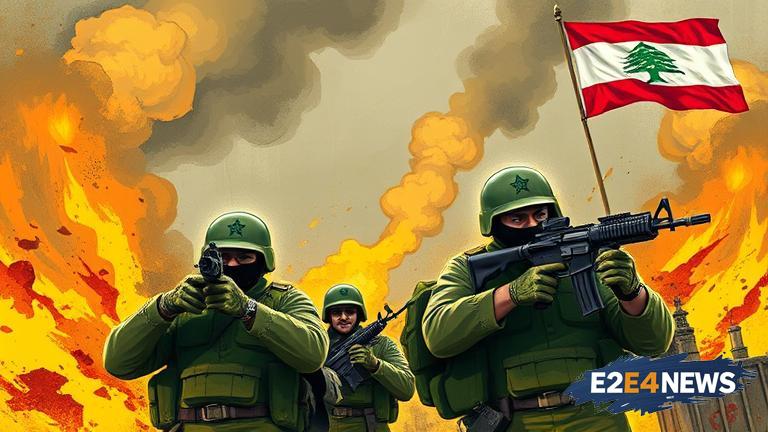The Lebanese militant group Hezbollah has reiterated its refusal to disarm, despite mounting pressure from the international community. This stance has significant implications for the upcoming talks between the US and Lebanon, which are expected to focus on a range of issues, including security, economy, and regional politics. Hezbollah’s stance is likely to be a major point of contention, given its designation as a terrorist organization by the US and other Western countries. The group’s arsenal, which includes thousands of rockets and missiles, is seen as a major threat to regional stability. Hezbollah’s leader, Hassan Nasrallah, has consistently refused to disarm, citing the need to protect Lebanon from Israeli aggression. The US has been pushing for Hezbollah’s disarmament as a condition for providing economic and military aid to Lebanon. However, Hezbollah’s refusal to comply has created a major obstacle to progress in the talks. The US has also been seeking to strengthen its alliance with Lebanon, which is seen as a key partner in the region. But Hezbollah’s dominance of Lebanese politics has made it difficult for the US to achieve its goals. The group’s influence extends beyond Lebanon, with significant operations in Syria and Iraq. Hezbollah’s military capabilities have been bolstered by its alliance with Iran, which has provided significant financial and military support. The US has imposed sanctions on Hezbollah and its allies, but the group remains a major force in the region. The upcoming talks between the US and Lebanon are seen as a critical moment in the relationship between the two countries. The US is expected to push for greater cooperation on security issues, including the disarmament of Hezbollah. But Hezbollah’s refusal to comply has created a major challenge for the US. The group’s stance has also been supported by some Lebanese politicians, who see it as a necessary evil in the face of Israeli aggression. However, others have criticized Hezbollah’s refusal to disarm, citing the need for Lebanon to assert its sovereignty and independence. The international community has also been critical of Hezbollah’s stance, with the UN calling for the group’s disarmament. The EU has also imposed sanctions on Hezbollah, citing its terrorist activities. Despite the pressure, Hezbollah remains committed to its stance, with Nasrallah vowing to never disarm. The group’s refusal to comply has significant implications for the region, with the potential for increased tensions and conflict. The US and Lebanon are expected to discuss a range of issues during the talks, including economic cooperation and regional security. But Hezbollah’s dominance of Lebanese politics is likely to remain a major obstacle to progress. The group’s influence extends beyond Lebanon, with significant implications for regional stability. The international community is watching the situation closely, with concerns over the potential for conflict and instability.
